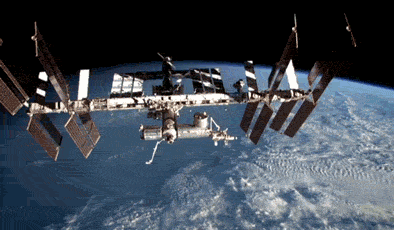ISS - Expedition 65 Mission patch.
August 20, 2021
The Expedition 65 crew is going into the weekend preparing for a spacewalk on Tuesday while juggling a variety of microgravity research.
Astronauts Mark Vande Hei of NASA and Akihiko Hoshide of the Japan Aerospace Exploration Agency (JAXA) are less than a week away from exiting the U.S. Quest airlock to prepare the International Space Station for its third Roll-Out Solar Array. The two spacewalkers have been gearing up all week checking their spacesuits, configuring their tools, and reviewing their procedures for the planned six-hour and 50-minute excursion.
Image above: Astronauts Mark Vande Hei and Akihiko Hoshide check their U.S. spacesuits to get ready for a spacewalk prepare the station for its third Roll-Out Solar Array. Image Credit: NASA.
They will set their U.S. spacesuits to battery power on Tuesday at 8:30 a.m. EDT signifying the start of their spacewalk with NASA TV, NASA app, and agency website coverage beginning at 7 a.m. NASA TV will also broadcast a briefing on Monday at 2 p.m. discussing Tuesday’s spacewalk activities.
The spacewalkers will be assisted by Flight Engineers Megan McArthur of NASA and Thomas Pesquet of ESA (European Space Agency). The pair joined Vande Hei and Hoshide today for more spacewalk reviews and a conference with experts on the ground.
Spacewalk. Animation Credit: NASA
Vande Hei, despite preparations for his fifth career spacewalk, also had time today for biology research taking microscopic photographs of engineered tissue samples for the Cardinal Muscle investigation. Observations may help doctors learn how to treat space-caused muscle loss and Earth-bound muscle conditions.
NASA Flight Engineer Shane Kimbrough spent his day on human research, physics and botany duties aboard the orbiting lab. First, he collected his urine samples and stowed them in a science freezer for later analysis as part of the Repository human research study. Following that, Kimbrough opened up the Combustion Integrated Rack and swapped fuel bottles to support research into flames and fuels in microgravity. Finally, the three-time space visitor cleaned up debris around the Plant Habitat Facility that is growing Hatch chiles for the Plant Habitat-04 experiment.
International Space Station (ISS). Animation Credit: NASA
Cosmonauts Oleg Novitskiy and Pyotr Dubrov spent Friday unpacking hardware and testing cable connections between the Nauka Multipurpose Laboratory Module and the Zvezda service module. The Russian Flight Engineers will also exit the Poisk module’s airlock twice in early September for more configuration work on the outside of Nauka.
Related links:
Expedition 65: https://www.nasa.gov/mission_pages/station/expeditions/expedition65/index.html
U.S. Quest airlock: https://www.nasa.gov/mission_pages/station/structure/elements/joint-quest-airlock
NASA TV: https://www.nasa.gov/multimedia/nasatv/index.html
Cardinal Muscle: https://www.nasa.gov/mission_pages/station/research/experiments/explorer/Investigation.html?#id=8509
Repository: https://www.nasa.gov/mission_pages/station/research/experiments/explorer/Investigation.html?#id=954
Combustion Integrated Rack: https://www.nasa.gov/mission_pages/station/research/experiments/explorer/Facility.html?#id=317
Plant Habitat Facility: https://www.nasa.gov/mission_pages/station/research/experiments/explorer/Facility.html?#id=2036
Plant Habitat-04: https://www.nasa.gov/mission_pages/station/research/experiments/explorer/Investigation.html?#id=8276
Zvezda service module: https://www.nasa.gov/mission_pages/station/structure/elements/zvezda-service-module.html
Poisk module: https://www.nasa.gov/mission_pages/station/structure/elements/poisk-mini-research-module-2
Space Station Research and Technology: https://www.nasa.gov/mission_pages/station/research/overview.html
International Space Station (ISS): https://www.nasa.gov/mission_pages/station/main/index.html
Image (mentioned), Animations (mentioned), Text, Credits: NASA/Mark Garcia.
Best regards, Orbiter.ch




